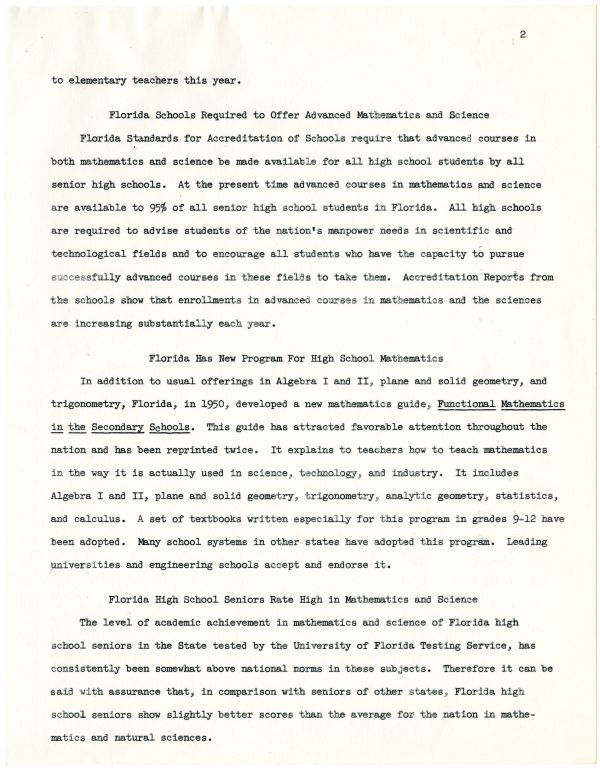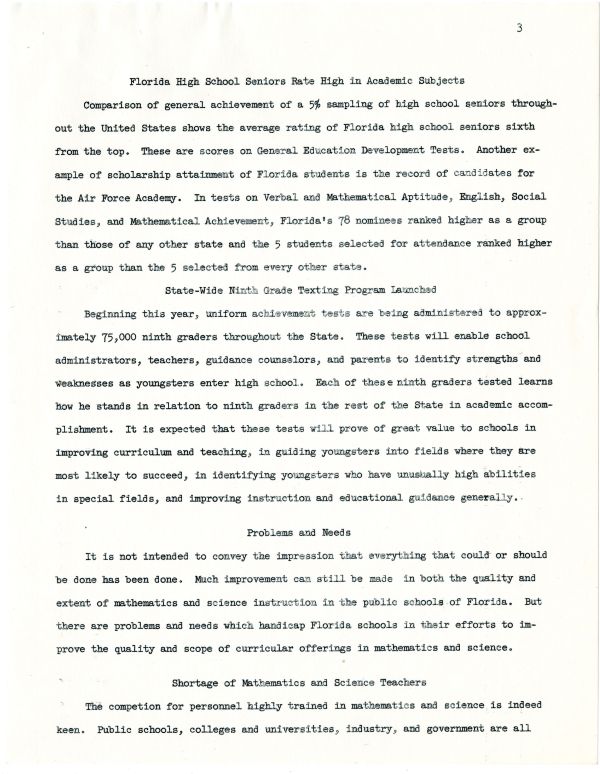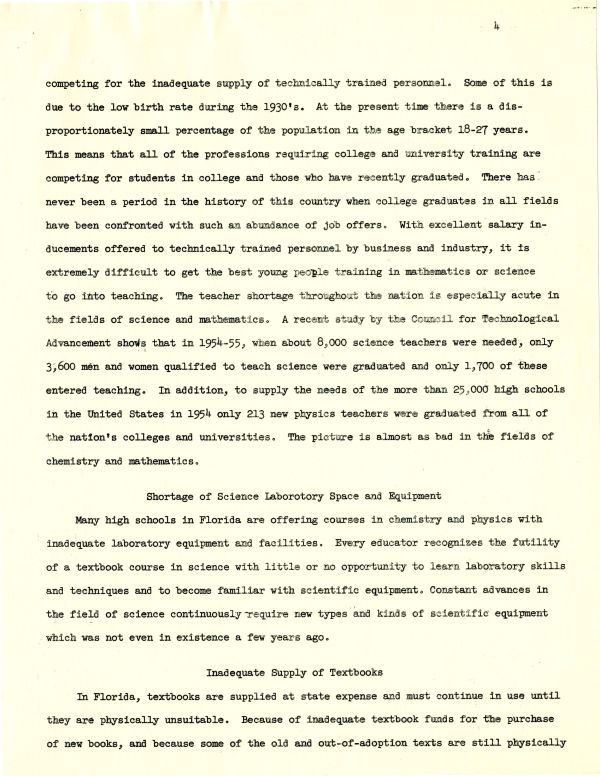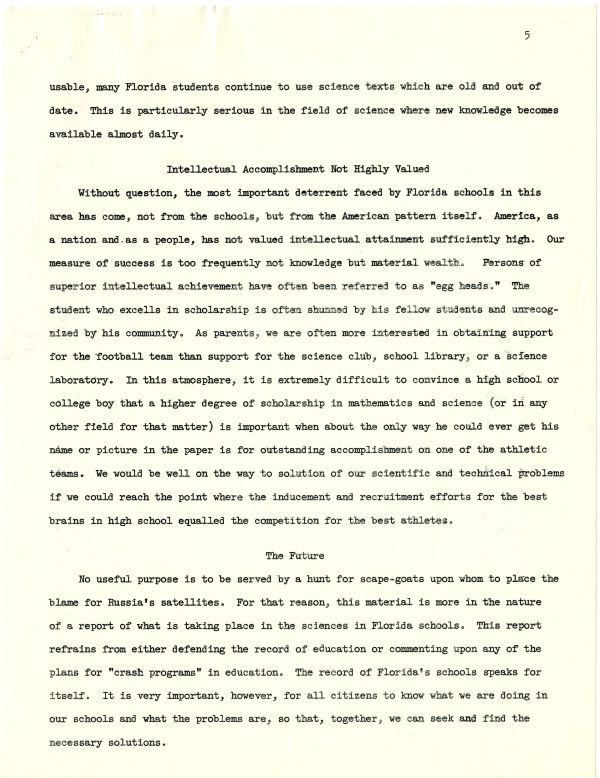Florida Memory is administered by the Florida Department of State, Division of Library and Information Services, Bureau of Archives and Records Management. The digitized records on Florida Memory come from the collections of the State Archives of Florida and the special collections of the State Library of Florida.

State Archives of Florida
- ArchivesFlorida.com
- State Archives Online Catalog
- ArchivesFlorida.com
- ArchivesFlorida.com
State Library of Florida
Related Sites
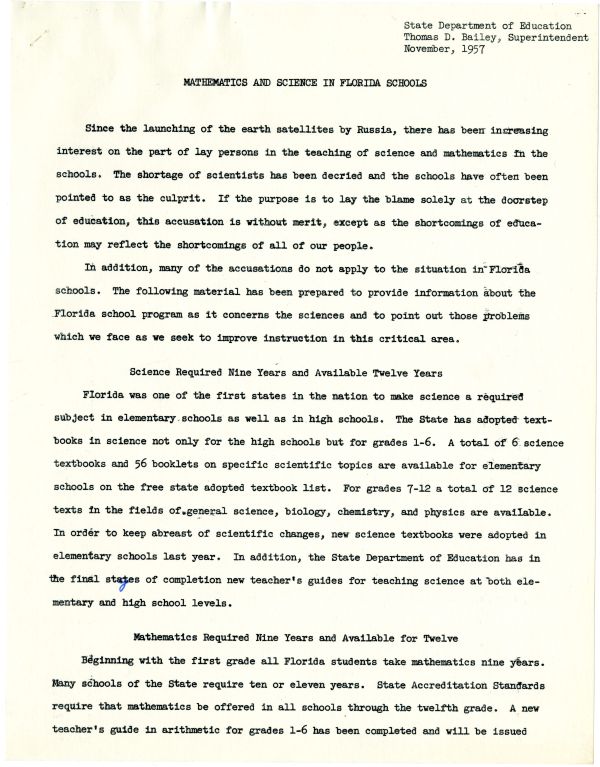
Description of previous item
Description of next item

Source
Description
Date
Format
Coverage
Topic
Subjects
Geographic Term
General Note
State Department of Education
Thomas D. Bailey, Superintendent
November, 1957
MATHEMATICS AND SCIENCE IN FLORIDA SCHOOLS
Since the launching of the earth satellites by Russia, there has been increasing interest on the part of lay persons in the teaching of science and mathematics in the schools. The shortage of scientists has been decried and the schools have often been pointed to as the culprit. If the purpose is to lay the blame solely at the doorstep of education, this accusation is without merit, except as the shortcomings of education may reflect the shortcoming of all of our people.
In addition, many of the accusations do not apply to the situation in Florida schools. The following material has been prepared to provide information about the Florida school program as it concerns the sciences and to point out those problems which we face as we seek to improve instruction in this critical area.
Science Required Nine Years and Available Twelve Years
Florida was one of the first states in the nation to make science a required subject in elementary schools as well as in high schools. The State has adopted textbooks in science not only for the high schools but for grades 1-6. A total of 6 science textbooks and 56 booklets on specific scientific topics are available for elementary schools on the free state adopted textbook list. For grades 7-12 a total of 12 science texts in the fields of general science, biology, chemistry, and physics are available. In order to keep abreast of scientific changes, new science textbooks were adopted in elementary schools last year. In addition, the State Department of Education has in the final stages of completion new teacher's guides for teaching science at both elementary and high school levels.
Mathematics Required Nine Years and Available for Twelve
Beginning with the first grade all Florida students take mathematics nine years. Many schools of the State require ten or eleven years. State Accreditation Standards require that mathematics be offered in all schools through the twelfth grade. A new teacher's guide in arithmetic for grades 1-6 has been completed and will be issued
Title
Subject
Description
Creator
Source
Date
Format
Language
Type
Identifier
Coverage
Geographic Term
Thumbnail
ImageID
topic
Subject - Corporate
Transcript
State Department of Education
Thomas D. Bailey, Superintendent
November, 1957
MATHEMATICS AND SCIENCE IN FLORIDA SCHOOLS
Since the launching of the earth satellites by Russia, there has been increasing interest on the part of lay persons in the teaching of science and mathematics in the schools. The shortage of scientists has been decried and the schools have often been pointed to as the culprit. If the purpose is to lay the blame solely at the doorstep of education, this accusation is without merit, except as the shortcomings of education may reflect the shortcoming of all of our people.
In addition, many of the accusations do not apply to the situation in Florida schools. The following material has been prepared to provide information about the Florida school program as it concerns the sciences and to point out those problems which we face as we seek to improve instruction in this critical area.
Science Required Nine Years and Available Twelve Years
Florida was one of the first states in the nation to make science a required subject in elementary schools as well as in high schools. The State has adopted textbooks in science not only for the high schools but for grades 1-6. A total of 6 science textbooks and 56 booklets on specific scientific topics are available for elementary schools on the free state adopted textbook list. For grades 7-12 a total of 12 science texts in the fields of general science, biology, chemistry, and physics are available. In order to keep abreast of scientific changes, new science textbooks were adopted in elementary schools last year. In addition, the State Department of Education has in the final stages of completion new teacher's guides for teaching science at both elementary and high school levels.
Mathematics Required Nine Years and Available for Twelve
Beginning with the first grade all Florida students take mathematics nine years. Many schools of the State require ten or eleven years. State Accreditation Standards require that mathematics be offered in all schools through the twelfth grade. A new teacher's guide in arithmetic for grades 1-6 has been completed and will be issued
to elementary teachers this year
Florida Schools Required to Offer Advanced Mathematics and Science
Florida Standards for Accreditation of Schools require that advanced courses in both mathematics and science be made available for all high school students by all senior high schools. At the present time advanced courses in mathematics and science are available to 95% of all senior high school students in Florida. All high schools are required to advise students of the nation's manpower needs in scientific and technological fields and to encourage all students who have the capacity to pursue successfully advanced courses in theses fields to take them. Accreditation Reports from the schools show that enrollments in advanced courses in mathematics and the sciences are increasing substantially each year.
Florida Has New Program For High School Mathematics
In addition to unusual offerings in Algebra I and II, plane and solid geometry, and trigonometry, Florida, in 1950, developed a new mathematics guide, Functional Mathematics in the Secondary Schools. This guide has attracted favorable attention throughout the nation and has been reprinted twice. It explains to teachers how to teach mathematics in the way it is actually used in science, technology, and industry. It includes Algebra I and II, plane and solid geometry, trigonometry, analytic geometry, statistics, and calculus. A set of textbooks written especially for this program in grades 9-12 have been adopted. Many school systems in other states have adopted this program. Leading universities and engineering schools accept and endorse it.
Florida High School Seniors Rate High in Mathematics and Science
The level of academic achievement in mathematics and science of Florida high school seniors in the State tested by the University of Florida Testing Service, has consistently been somewhat above national norms in these subjects. Therefore it can be said with assurance that, in comparison with seniors of other states, Florida high school seniors show slightly better scores than the average for the nation in mathematics and natural sciences.
Florida High School Seniors Rate High in Academic Subjects
Comparison of general achievement of a 5% sampling of high school seniors throughout the United States shows the average rating of Florida high schools seniors sixth from the top. These are scores on General Education Development Tests. Another example of scholarship attainment of Florida students is the record of candidates for the Air Force Academy. In tests on Verbal and Mathematical Aptitude, English, Social Studies, and Mathematical Achievement, Florida's 78 nominees ranked higher as a group than those of any other state and the 5 students selected for attendance ranked higher as a group than the 5 selected from every other state.
State-Wide Ninth Grade Testing Program Launched
Beginning this year, uniform achievement tests are being administered to approximately 75,000 ninth graders throughout the State. These tests will enable school administrators, teachers, guidance counselors, and parents to identify strengths and weaknesses as youngsters enter high school. Each of these ninth graders tested learns how he stands in relation to ninth graders in the rest of the State in academic accomplishment. It is expected that these tests will prove of great value to schools in improving curriculum and teaching, in guiding youngsters into fields where they are most likely to succeed, in identifying youngsters who have unusually high abilities in special fields, and improving instruction and educational guidance generally.
Problems and Needs
It is not intended to convey the impression that everything that could or should be done has been done. Much improvement can still be made in both the quality and extent of mathematics and science instruction in the public schools of Florida. But there are problems and needs which handicap Florida schools in their efforts to improve the quality and scope of curricular offerings in mathematics and science.
Shortage of Mathematics and Science Teachers
The competition for personnel highly trained in mathematics and science is indeed keen. Public schools, colleges and universities, industry, and government are all
competing for the inadequate supply of technically trained personnel. Some of this is due to the low birth rate during the 1930's. At the present time there is a disproportionately small percentage of the population in the age bracket 18-27 years. This means that all of the professions requiring college and university training are competing for students in college and those who have recently graduated. There has never been a period in the history of this country when college graduates in all fields have been confronted with such an abundance of job offers. With excellent salary inducements offered to technically trained personnel by business and industry, it is extremely difficult to get the best young people training in mathematics or science to go into teaching. The teacher shortage throughout the nation is especially acute in the fields of science and mathematics. A recent study by the Council for Technological Advancement shows that in 1954-44, when about 8,000 science teachers were needed, only 3,600 men and women qualified to teach science were graduated and only 1,700 of these entered teaching. In addition, to supply the needs of the more than 25,000 high schools in the United States in 1954 only 213 new physics teachers were graduated from all of the nation's colleges and universities. The picture is almost as bad in the fields of chemistry and mathematics.
Shortage of Science Laboratory Space and Equipment
Many high schools in Florida are offering courses in chemistry and physics with inadequate laboratory equipment and facilities. Every educator recognizes the futility of a textbook course in science with little or no opportunity to learn laboratory skills and techniques and to become familiar with scientific equipment. Constant advances in the field of science continuously require new types and kinds of scientific equipment which was not even in existence a few years ago.
Inadequate Supply of Textbooks
In Florida, textbooks are supplied at state expense and must continue in use until they are physically unsuitable. Because of inadequate textbook funds for the purchase of new books, and because some of the old and out-of-adoption texts are still physically
usable, many Florida students continue to use science texts which are old and out of date. This is particularly serious in the field of science where new knowledge becomes available almost daily.
Intellectual Accomplishment Not Highly Valued
Without question, the most important deterrent faced by Florida schools in this area has come, not from the schools, but from the American pattern itself. American, as a nation and as a people, has not valued intellectual attainment sufficiently high. Our measure of success is too frequently not knowledge but material wealth. Persons of superior intellectual achievement have often been referred to as “egg heads.” The student who excels in scholarship is often shunned by his fellow students and unrecognized by his community. As parents, we are often more interested in obtaining support for the football team than support for the science club, school library, or a science laboratory. In this atmosphere, it is extremely difficult to convince a high school or college boy that a higher degree of scholarship in mathematics and science (or in any other field for that matter) is important when about the only way he could ever get his name or picture in the paper is for outstanding accomplishment on one of the athletic teams. We would be well on the way to solution of our scientific and technical problems if we could reach the point where the inducement and recruitment efforts for the best brains in high school equaled the competition for the best athletes.
The Future
No useful purpose is to be served by a hunt for scape-goats upon whom to place the blame for Russia's satellites. For that reason, this material is more in the nature of a report of what is taking place in the sciences in Florida schools. This report refrains from either defending the record of education or commenting upon any of the plans for “crash programs” in education. The record of Florida's schools speaks for itself. It is very important, however, for all citizens to know what we are doing in our schools and what the problems are, so that, together, we can seek and find the necessary solutions.
General Note
Chicago Manual of Style
Florida. Department of Education. Mathematics and Science in Florida Schools, 1957. 1957-11. State Archives of Florida, Florida Memory. <https://www.floridamemory.com/items/show/341194>, accessed 4 March 2026.
MLA
Florida. Department of Education. Mathematics and Science in Florida Schools, 1957. 1957-11. State Archives of Florida, Florida Memory. Accessed 4 Mar. 2026.<https://www.floridamemory.com/items/show/341194>
AP Style Photo Citation
(State Archives of Florida/Florida. Department of Education)

 Listen: The Bluegrass & Old-Time Program
Listen: The Bluegrass & Old-Time Program